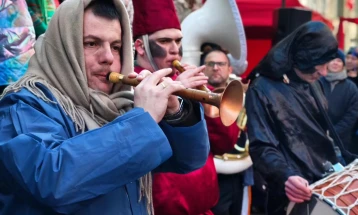Sarah Aroeste: Monastir — a prewar portrait of Jewish North Macedonia

20 August 2021
Financial Times
“Bitola, the city of my birth,” sings Sarah Aroeste to a bright melody of clarinet and Balkan woodwind, “you to me are paradise.” The song unwinds, the singing joyful. “Is there anyone who says farewell to you and does not weep?” Ajri Demirovski’s Macedonian folk song, “Bitola, Moj Roden Kraj”, is a popular favourite in the long-contested city it celebrates, but coming at the end of Aroeste’s new album it has a darker resonance.
Bitola — known until 1913 as Monastir — was home to a sizeable Ladino Jewish community, displaced from Spain after the Reconquista. In 1943, under Nazi occupation, they were rounded up and sent to Treblinka. Today, not a single Jew remains.
Aroeste’s grandfather grew up in Monastir, the family moving to the US during the Balkan Wars of 1912-13, so for her the city’s history is personal. Her album recreates the prewar world of Jewish Monastir, with the help of Orthodox and Muslim musicians from North Macedonia, as well as Israelis.
The songs are a mixture of folktale and everyday life. On “Edno Vreme Si Bev Ergen” the Macedonian singer Sefedin Bajramov narrates the story of an unemployed bachelor strolling through the city, meeting a Jewish girl with unkempt hair. “I told her in Slavonic/to become Slavic,” he sings, making it sound like an invitation rather than a threat, as piano and accordion vamp. The traditional “Od Bitola Pojdov”, with buzzing Balkan bounce, feels like a premonition of the Beach Boys’ “California Girls”, with none of the neighbouring cities matching up to Bitola. Prilep girls are all tobacco girls; Skopje girls are all millers; Tetovo girls are all bean farmers. But “Bitola girls, they cure all wounds.”
A kindergarten class sings “Estreja Mara”, which despite its nursery ornamentation is a song of praise to a 21-year-old resistance fighter who died in 1944 fighting off the Bulgarian army. An adult choir backs Aroeste on her own composition “Mi Monastir”, a collage of images of the city, mingling “fez, crochet and mezuzah”. It starts with delicate guitar from Israeli musician Tal Yadin and swells into epic choruses.
The album opens with its most affecting song, “Oy Qui Muevi Mezis”, a celebration of a new birth. “What nine months of discomfort you have had.” The percussion patters and strains, with a reedy wail from a woodwind instrument. The song accelerates as the baby is born. The father approaches the bed. “Today I did not eat,” the mother tells him. “Quickly, bring her fattened chicken.” And the festivities burst out into the streets.







